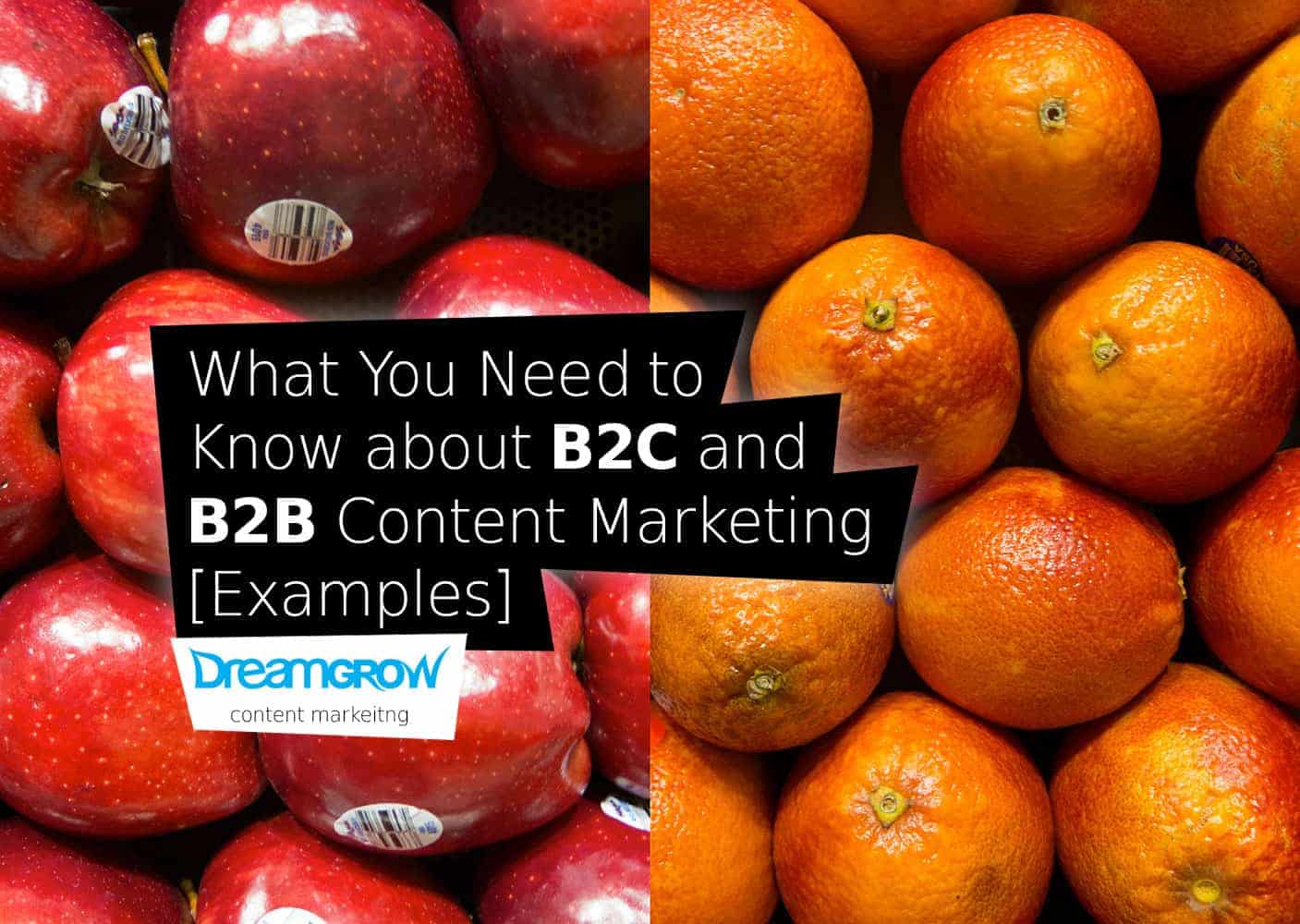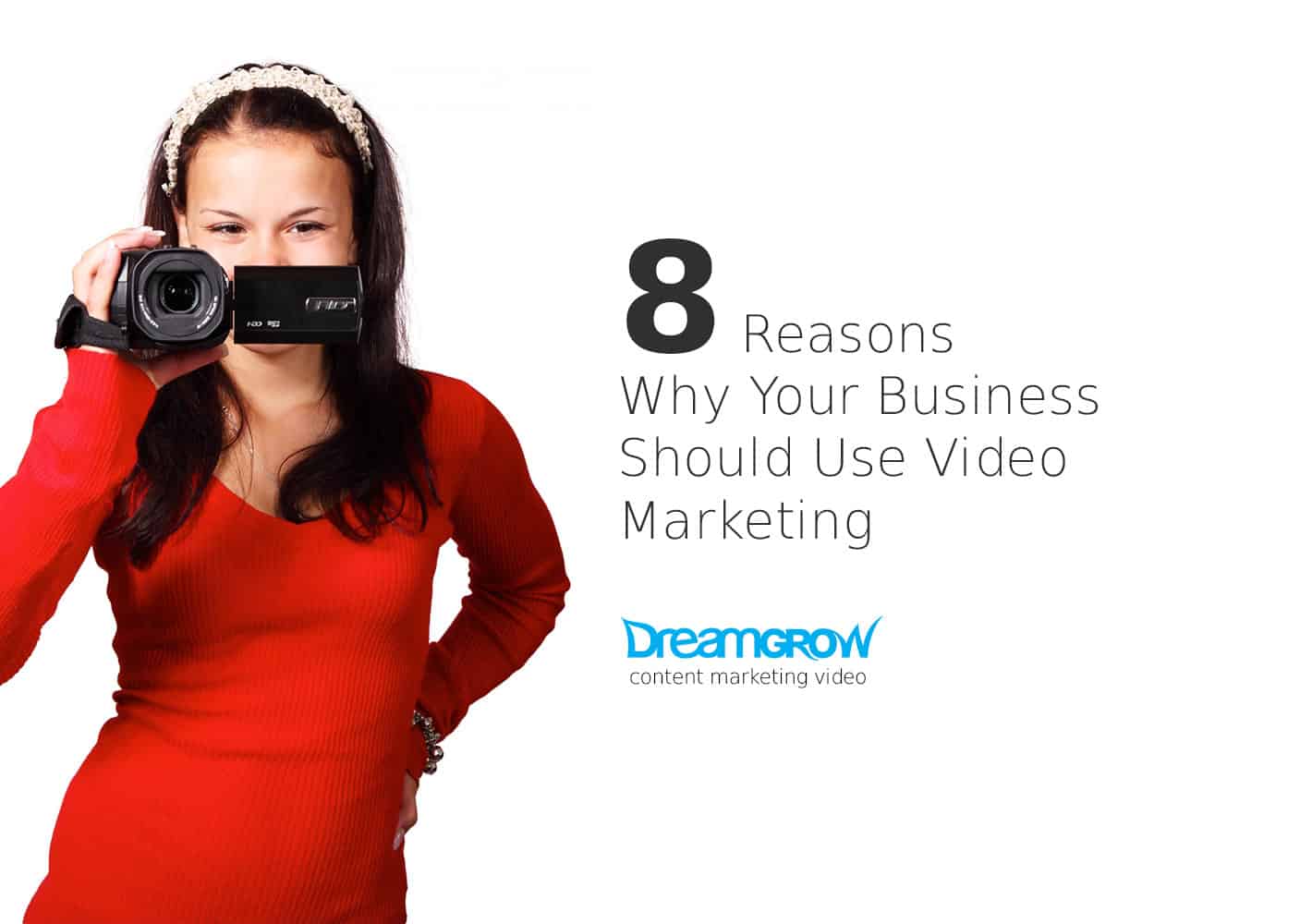Though business-to-consumer B2C and business-to-business B2B content marketing strategies have many things in common, the main differences between B2B content marketing strategies and B2C are the goals and target audiences of each type of business.
Marketers in either situation are selling products to people. However, it’s a vastly different challenge to sell a product to a business versus selling a product to a consumer.
Each one needs to fine-tune their online content to best meet the needs of their market. Here are some major differences between content marketing strategies of B2B and B2C companies.
Audience Values
It may seem like an obvious point, but it’s worth establishing a base understanding of what B2B and B2C audiences want.
B2C consumers are motivated by emotional and physical needs. This means marketers are more likely to appeal to desires for things like a higher status, a more attractive appearance, or limited offers that compel consumers to take action now or miss out.
They want to be entertained and amused, and when possible, feel a sense of community with the brands they engage with.
Often, their main concern beyond their own experience is how peers, friends, and family perceive them.
Counter to this, B2B clients are focused on reliable business relationships, rational concerns such as price, and utility.
The content they expect is highly informational rather than entertaining.
Instead of being concerned with how people in their personal lives will perceive their purchase, B2B clients have competitors and a consumer base of their own to consider.
They are more interested in how their purchase will impact their own market value.
Businesses want to know how a product or service will help them to achieve their own goals and how good of a deal they will get.
B2C and B2B Content Marketing Goals
According to a survey by the Content Marketing Institute, 80 percent of B2B content marketers are focused on generating leads. This makes it the top goal for B2B content marketing, followed by brand awareness at 79 percent and engagement at 71 percent.
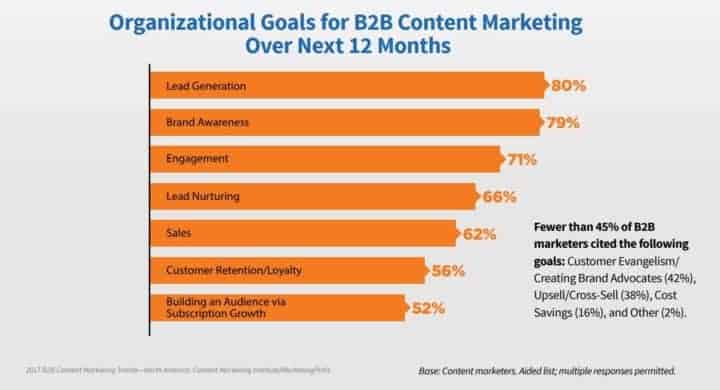
In contrast, the top focus of B2C content marketers is brand awareness at 74 percent. This is followed by engagement at 71 percent, and lead generation at 66 percent.
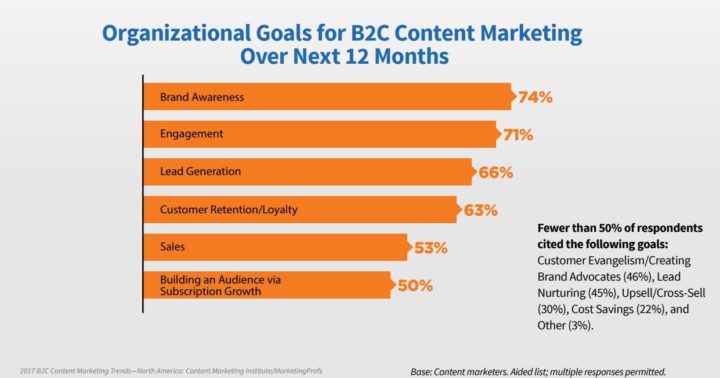
These statistics may seem to draw only a subtle difference between B2B and B2C companies. However, the practical applications of their priorities are significant.
Although establishing brand awareness and generating leads feed into each other, B2B companies rely more heavily on cultivating long-term relationships with their customers than B2C companies.
Of course, B2C companies also strive to establish positive relationships with consumers, as with any company.
The distinction comes from the fact that a B2B company typically sees fewer, yet larger transactions from client businesses. Also, B2B clients may continue to use the company’s services for years if the relationship goes well.
B2C marketers also focus on building their brand’s reputation and establishing brand loyalty with consumers, but their overall marketing goals tend to be more transactional.
B2C shoppers often make smaller purchases less frequently, and there is no expectation that they will necessarily buy from the company again.
Because of this, it makes sense that B2C companies would prioritize awareness of their brand rather than investing time and money into individual customer relationships.
Sales Cycles
Let’s take a closer look at the purchasing processes for each of these.
B2B companies put a lot of effort into streamlining their sales cycle, which is typically much longer and more expensive to manage than in B2C interactions.
The sales cycle is longer because the point of contact with a potential client company may not be the decision-maker. The purchase may have to go through many rounds of negotiations with several team members before it is approved.
The process can take a few weeks, months, or even a year to complete a sale.
A B2B consumer will usually need to prove a return on investment (ROI) before buying from a company.
The ROI could save the B2B consumer money, time, or resources, but it is important that everyone on the decision-making team has a clear understanding of the direct impacts they can expect from a B2B company’s product.
Collecting data about the business can help marketers to create content that appeals to the logic-oriented goals of B2B content marketing.
Case studies illustrating the effects of the product on another client’s business are a great way to show the potential ROI.
If possible, it’s even more effective to focus on a company the B2B consumer is familiar with.
The long cycle also makes it critical for you to collect their emails so you can keep educating them in the future.
B2C marketers often create content that speaks directly to the decision-maker.
Because of this, a sale can happen immediately once the buyer is ready.
Direct contact with the decision maker allows marketers to focus more on brand awareness strategies, engaging a larger number of people who make purchases less often.
B2C and B2B Content Marketing Materials
The target audience for a B2C company is much broader, and they have more freedom in the types of content they can produce to drive sales.
It’s often easier to talk about B2C products in online content as they are designed to meet the needs of many people rather than a specific niche. For example, it is easier to talk about shoes and sunglasses than complicated medical devices.
There are some industries that allow companies to utilize both B2B and B2C markets, but B2B products aren’t usually designed for the general public.
A business that sells vending machines isn’t likely to sell their product to individuals on a regular basis.
Instead, B2B companies need to tailor their message to channels that appeal to specific niches.
They can best communicate within these niches by creating more individualized, informational content that helps to establish them as thought leaders.
To earn a reputation as an expert in their industry, B2B companies should produce detailed, research-oriented content that provides value to a consumer business.
Examples of content well suited for B2B content marketing include webinars, infographics, white papers, eBooks, and case studies.
Each of these allows B2B businesses to go in-depth about industry issues. Without being overly promotional, the B2B can position their brand within the context.
Conversely, B2C businesses don’t usually need to provide in-depth studies to consumers to sell their products and services.
Instead, they should focus on building a sense of community through social media.
A company blog that provides entertaining articles and a behind-the-scenes look at the organization can also encourage consumers to engage with a brand.
Other useful forms include product comparison charts, consumer and expert reviews, and product videos.
B2C and B2B brands can both benefit from using online video in their marketing strategies, though again, they each use the medium with different goals and target audiences in mind.
According to the Content Marketing Institute, 60 percent of B2C marketers use videos in their marketing strategy, making it the fourth most used tactic after social media content, blogs, and email newsletters.
The same percentage of B2B marketers use video as part of their strategy, though it is ranked sixth after social media, blogs, email newsletters, in-person events, e-books/white papers.
Examples of Successful B2B Content Marketing Campaigns
Understanding the major differences between marketing strategies for B2B and B2C companies is a good start. Here are a few examples of B2B content marketing campaigns that set some B2B companies apart.
1. The CB Insights newsletter provides a regular channel for the company to share relevant information with consumers.
The casual, humorous tone allows the company to convey useful insights while also engaging their audience in an entertaining way.
Their newsletter is an example of a simple concept done well, which proves that you don’t need to be highly innovative or interactive to create solid content.
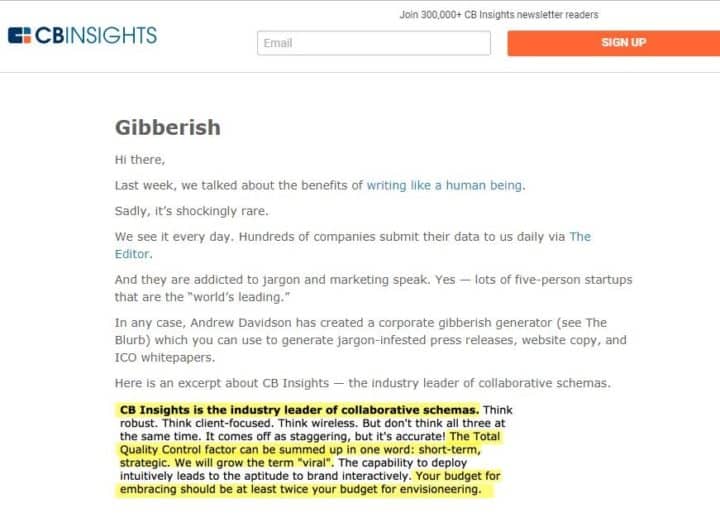
2. Mattermark’s “Raise the Bar” curates a variety of content about sales, marketing, and growth engineering.
This provides consumers in the industry a one-stop location for a variety of topics, offering in-depth informational value and saving consumer businesses the time it would take to do their own research.
Their content isn’t always directly related to the services they provide, which might come off as overly promotional. Instead, “Raise the Bar” is a useful resource that establishes trust in Mattermark's expertise in a range of subjects related to marketing.
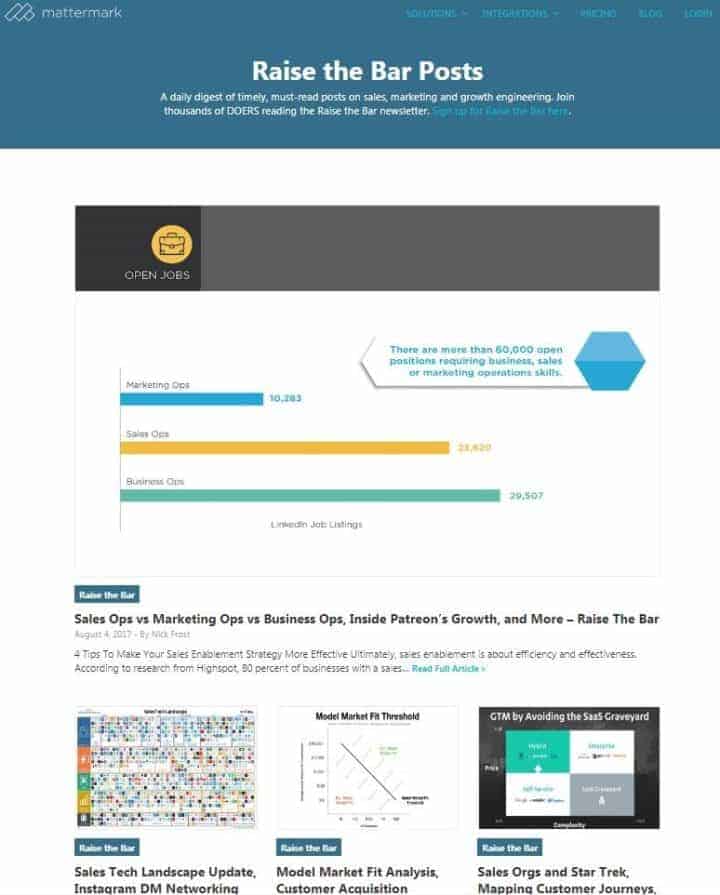
3. First Round has created several online magazines that cater to individual facets of startups, including management, culture, marketing, design, and fundraising.
By carefully organizing the content, they create a user-friendly experience and allow the audience to follow in-depth explorations into a variety of topics, pulling insights from experts in the field.
Using in-depth content is a great example of an organization that reaches out to professionals in their industry to provide their audience with valuable lessons.
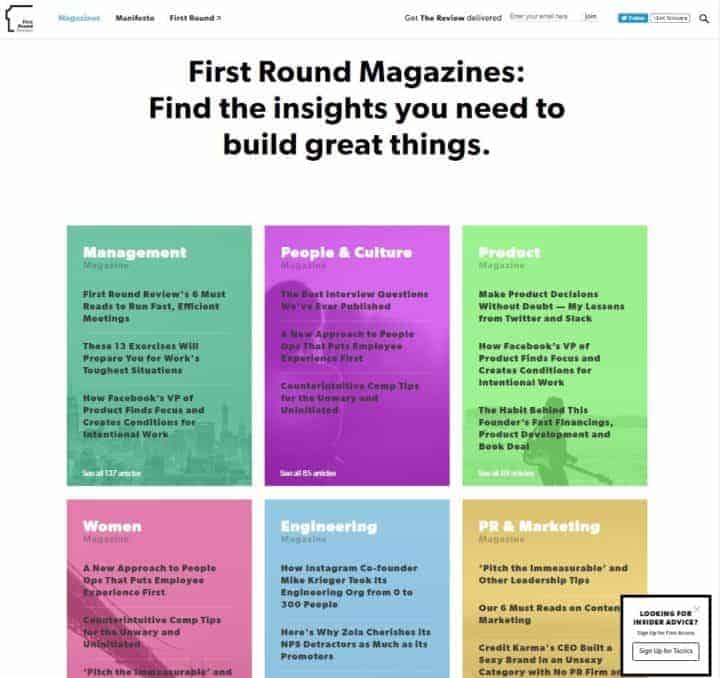
Examples of Successful B2C Content Marketing Campaigns
1. Grammarly uses humor to market their grammar correction services on their blog and social media.
They could easily provide informational appeals about their product by explaining the ways poor grammar can affect your public perception.
Though they do provide practical content, information alone isn’t entertaining enough to draw in their audience and achieve a viral following.
Instead, they creatively explore the humorous possibilities within the grammar, such as a style guide on how to speak like the Star Wars character Yoda and a list of pun-inspired Halloween costumes.
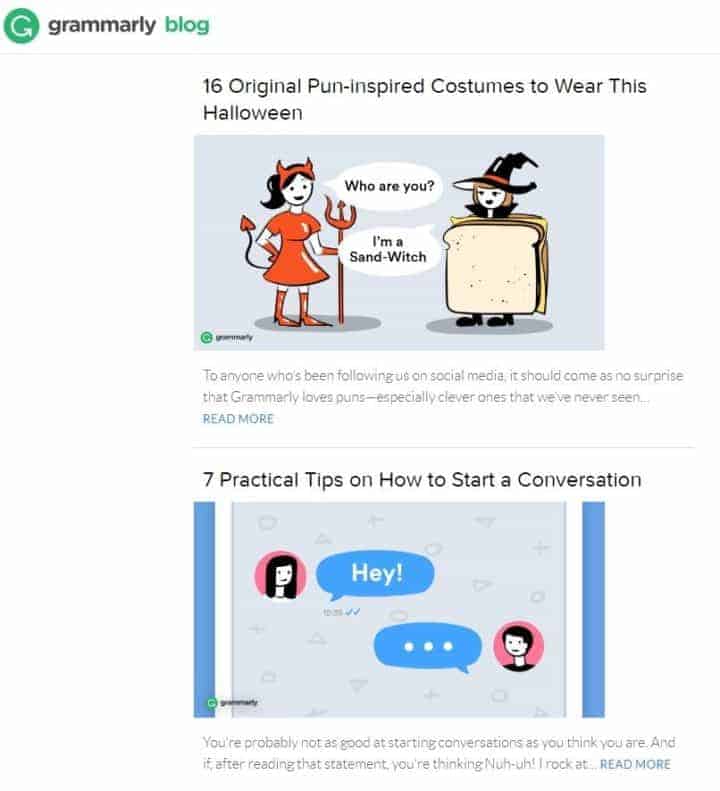
2. The Shelter Pet Project use their blog to showcase positive owner-pet relationships after pets are adopted.
A large number of animals in need of homes is a heavy subject that is often described with a serious tone.
However, along with testimonials about an animal’s backstory and new life, The Shelter Pet Project also provides a section in which they ask pet owners what their pet would say about their new life if they could talk.
This creates an opportunity for humor and a deeper emotional connection that can help prospective pet owners better understand the effects of their adoption.

3. The meal plan service Cook Smarts runs an Instagram account that features high quality images of many of the recipes you can order from the company.
Showing photographs of food is smart visual marketing. Yet, the real strength of the campaign comes in their inclusion of quotes from satisfied customers along with photos of their faces.
This adds a human element to their marketing strategies and allows consumers to empathize with satisfied customers.
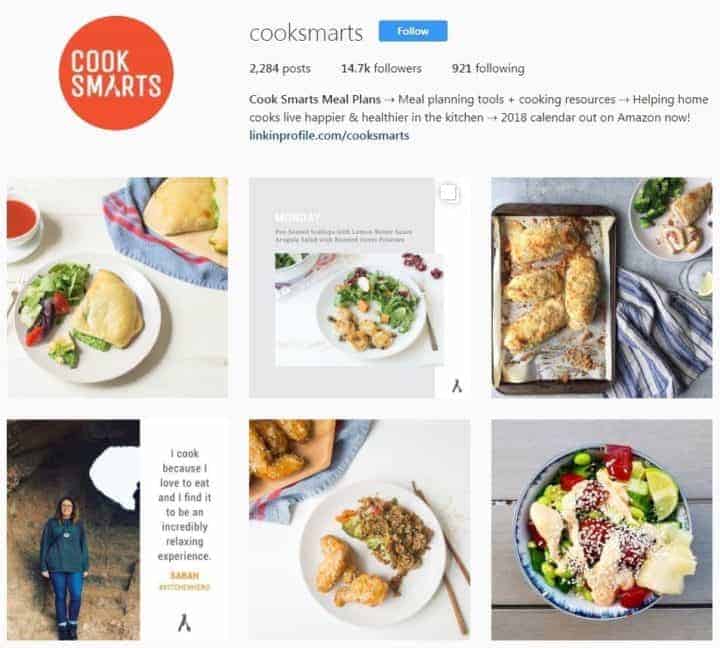
Similar but Different
At times there is overlap in the mediums B2B and B2C companies use to communicate with their target audiences.
However, due to the nature of their products and the needs of their consumer base, they use some of the same forms in very different ways.
By seeking niche channels and providing their prospective clients with in-depth industry information, B2B companies can prove they are thought leaders in their field and generate leads as well as encourage current client businesses to continue to trust their services.
In contrast, B2C companies can focus their content marketing strategies on creating casual, entertaining blog posts and photos that increase their brand awareness and encourage many smaller transactions.
________________
Photo credit: Robert Couse-Baker
